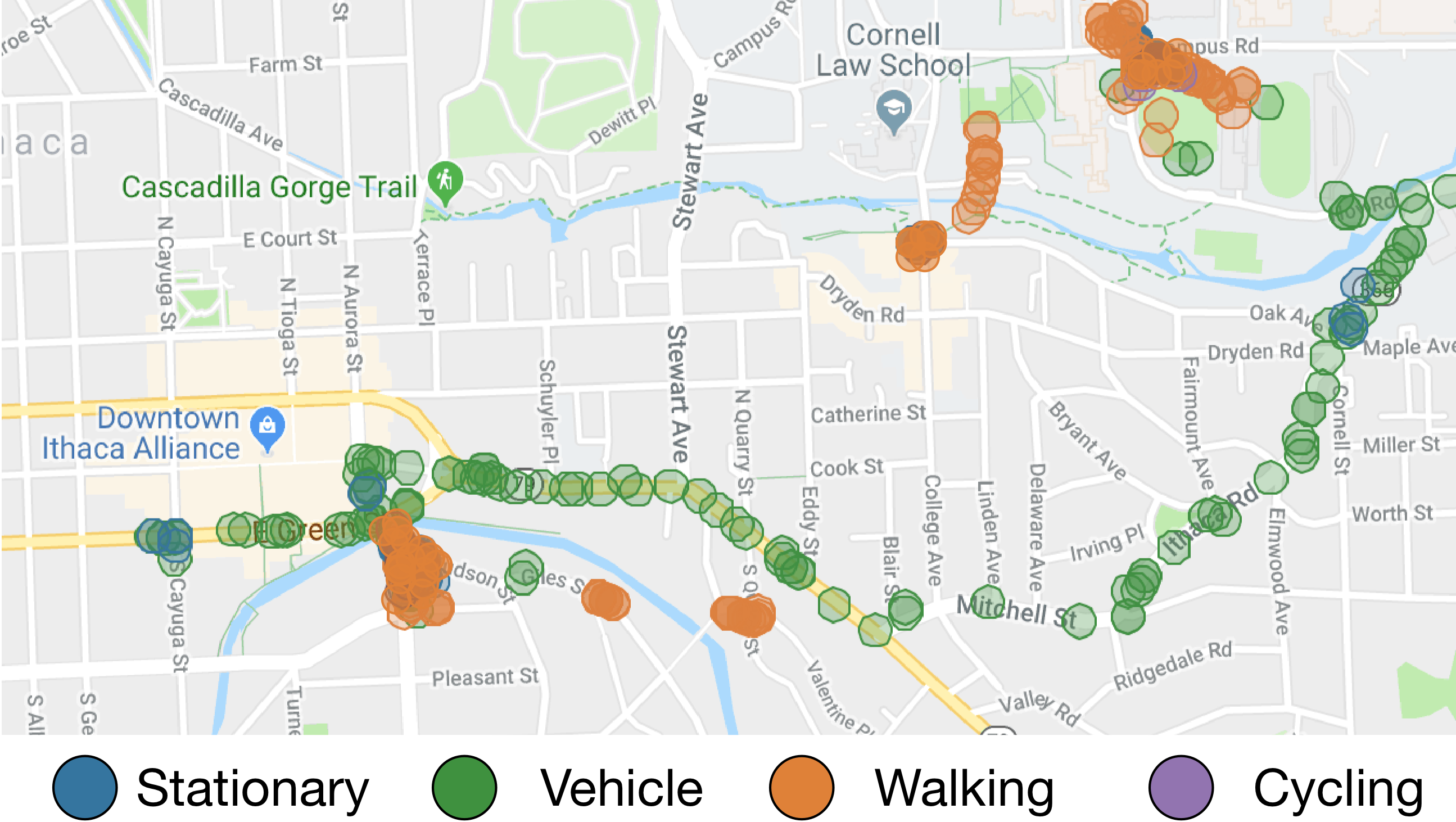Tech Nuggets with Technology: This Blog provides you the content regarding the latest technology which includes gadjets,softwares,laptops,mobiles etc
Thursday, April 30, 2020
Amazon says India business most affected due to Covid-19
ICANN board has voted to reject the sale of the .org registry to private equity firm Ethos Capital (ICANN)
ICANN:
ICANN board has voted to reject the sale of the .org registry to private equity firm Ethos Capital — Today, the ICANN Board made the decision to reject the proposed change of control and entity conversion request that Public Interest Registry (PIR) submitted to ICANN.
Amazon sees possible Q2 loss as it forecasts $4 billion in Covid-19-related costs
Reddit has disabled its chat room feature, Start Chatting, a day after launch due to "several errors" in rollout and moderators' concerns over lack of control (Monica Chin/The Verge)
Monica Chin / The Verge:
Reddit has disabled its chat room feature, Start Chatting, a day after launch due to “several errors” in rollout and moderators' concerns over lack of control — The company says the rollout had several errors — Remember how Reddit announced just yesterday that it was introducing built-in subreddit chat rooms?
IDC: Global smartphone shipments dropped 11.7% YoY to 276M during Q1 2020, the largest YoY decline ever (Aimee Chanthadavong/ZDNet)
Aimee Chanthadavong / ZDNet:
IDC: Global smartphone shipments dropped 11.7% YoY to 276M during Q1 2020, the largest YoY decline ever — Shipment volumes suffered its largest year over year decline in the first quarter. — The latest data from International Data Corporation (IDC) has revealed that as the world grapples …
Apple sales inch higher despite coronavirus but CEO Tim Cook sees uncertain future
SoloCoin goes on to win at EUvsVirus hackathon after winning CODE19 in India
SoloCoin is an app that encourages people to stay at home during the pandemic, with reward tokens, which can be exchanged for discounts on services that are useful during the lockdown, such as Netflix and Swiggy. The app came in third at the CODE19 hackathon organised in India on April 10, with the winners announced 4 days ago. The CODE19 hackathon was an effort to quickly find technological solutions for the challenges faced by the Covid-19 outbreak and the following nationwide lockdown. On April 30, there was more good news for the app, as it went on to win first place in the “other” subcategory of the “Social & Political Cohesion” category of the pan European EUvsVirus hackathon.
The founder of the app is India based Arbob Mehmood, a 22 year old who has previously founded Bramble. The main product of Bramble is an API that allows developers to reward gamers in cryptocurrencies for playing their games. The experience Mehmood gained from working with Bramble was used to work on SoloCoin. Specifically, a similar gamification system was used to reward people for staying at home, instead of playing the game. SoloCoin is an app that gamifies social distancing and rewards people with SoloCoins, a token currency within the application, that can be exchanged for discounts of services such as Amazon, Netflix, Swiggy, Zomato and other services that are required for staying at home. Currently, the coupons offered on the app are sourced through third party affiliates, but the team is working on integrated these coupons natively.
Building a team and onboarding partnersMehmood is an avid reader of our magazine, and we reached out to him to learn more about the application. One of the things that we noticed was that signing up for the app has a waitlist,and it has not been released just yet. If you are interested in the app, you can sign up for the waitlist here. One of our first questions was, why does the app have a waitlist in the place? Mehmood replied, “The app is still in development. It’s in private beta right now and is only accessible via an invite-only system that too within our community. We are planning on launching this app next month globally so we want some people to try it firsthand and give feedback so that we can release a relatively bug-free app.”
One of the effective ways in which the app, and the invite system is marketed and propagated, is through social media influencers. We asked Mehmood how the experience of working with influencers was. He responded, “I had worked with influencers in my previous startups, so, it was not new to me. We also have a community member with lots of influencer connections that helped us in connecting with them. The primary thing to know while talking with influencers is their charge because they negotiate way too much. Now, we were lucky here because we are an open-source startup tackling the COVID crisis so many of them agreed to do some of the marketing for free. Influencers can get you a great RoI if you choose them carefully according to your target market and have a way with negotiations.”
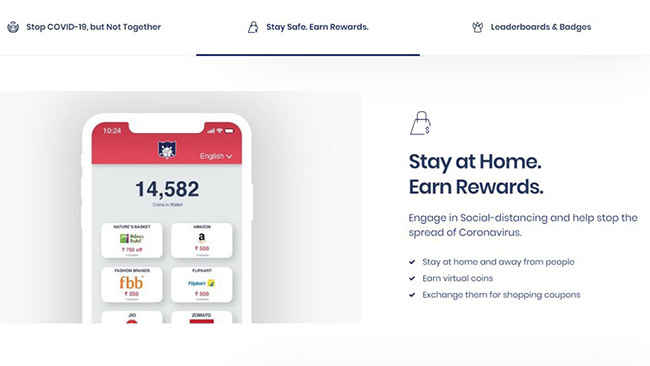
One of the reasons why the app is so successful, is that Mehmood put together a really good team to work on it. This team includes many people from around the world, who are really enthusiastic about the idea of the app. We asked him about the team and how it came together. Mehmood responded, “When I had the idea, I was building it on Python's Beeware toolkit which ports python code to a native mobile app. But it's features were limited. Then, I heard about COVID hackathons happening across the country. So, I started to scout for members across hackathons. Since the idea was innovative and impactful, many amazing people joined my team. then the team decided to make it on native Android and iOS directly for better usability and support. We have a group of open-source collaborators from around the world including startup founders & CXOs, people from IITs, BITS, Stanford, Microsoft, Uber, Github, Neuro-Researchers, and more among our community. The core team has 7 people in it with 20+ contributors across the different domains. The community count is 300+. The product is built 100% remotely.”
Apart from a great team, Mehmood has managed to onboard a large number of partners in a remarkably short span of time. We asked him how he achieved this, to which Mehmood said, “cold emails. Linkedin messages to senior employees and twitter DMs. basically, hustling our way through the partner contact. Our community members have worked very hard to get partners on board, however, we are still waiting for big guys like Amazon, Zomato and Swiggy to respond and officially come onboard (The coupons you’re seeing on our app page is basically affiliate coupons from other coupon websites.) but other big brands like Yatra’s CEO, 1MG, FitIndian, etc. have showed interest in us and are looking to integrate their services on our app. Again, a sense of contribution towards something bigger has helped us a lot in the exposure of our product. Brands genuinely want to join such noble cause and do their part in stopping the spread of COVID. So, I’d like to take this opportunity and invite potential partners who are reading this to join us, promote your services on our app, and help stop the spread of coronavirus.”
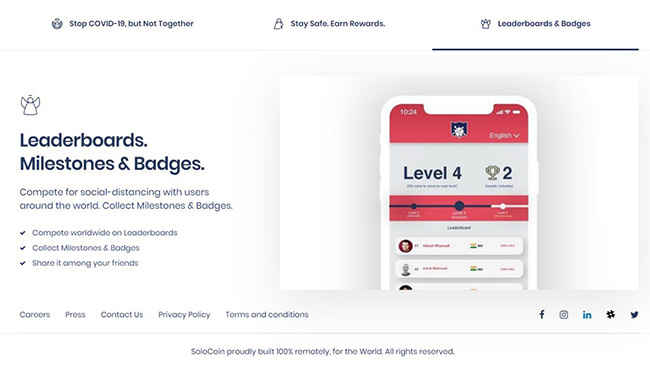
One of the things that really stood out to us was how awesome the UI was. We asked Mehmood about the process behind creating this aspect of the app. Part of the magic is continuous iterations based on user feedback. Mehmood responded, “we are an open-source, decentralized, community-based initiative. Brilliant People from all walks of life, around the world, have come together to make this app a success. Me and my teammate handle most of the design. I have great amount of experience in designing consumer and blockchain apps and my teammate Adesh Bhansali (a graduate from the Indian school of design and innovation) work on all the designs. I create a rough wireframe/mockup and he adds necessary colors and makes it more aesthetically pleasing to the users. Then we show the designs to the community and get feedback. Getting feedback is the most important part here since it helps us in getting different perspectives and ideas. Our primary goal with the design is to make our core features easily accessible and feel pleasing on the eyes so that people can interact with it more. And, after we’re done we finalize it and move it to frontend devs for final integration.”
One of the things that Mehmood pointed out to us, was that what really motivated people in using the app was not the money they got for discounts on products and services, but the knowledge that their efforts had in some way contributed to the global fight against the pandemic. We probed Mehmood on how he came to this realisation, and he said, “One thing I've noticed while building our product is the founder's vision and the potential impact of the said product is very important. When I first pitched the idea of SoloCoin, I was alone. But the idea was innovative and has never been done before. The vision I put to gamify social-distancing and help to stop the spread of COVID resonated with people and that helped us in getting amazing people with great skills from all over the world to voluntarily work on my idea without any financial incentive. I don’t think this would’ve have been possible if I had pitched a me-too idea or a less impactful idea in front of people. This is true for regular users and potential customers as well. There are many rewards app but the only reason we have received this much interest from the community and waitlist registration is that we were doing something that will help make the world a better place. We have learned that working towards something bigger is a much bigger reward than any discounts. With our app users had a sense of belonging and contribution towards a bigger cause. They are proud of it. And, it doesn’t hurt that by doing so, they can earn rewards and recognition in their social-circle.”
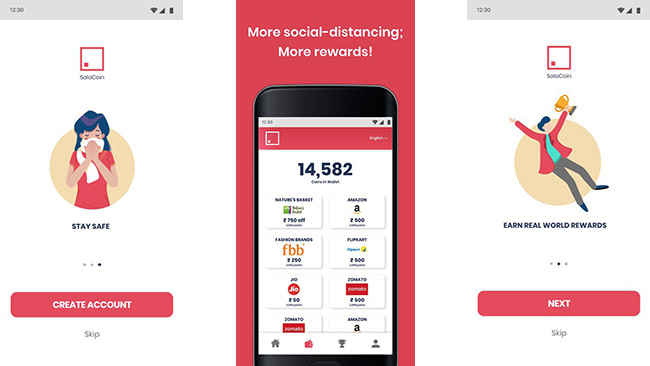
We then asked Mehmood on what are his future plans for the app, now that SoloCoin has won a national level and an international hackathon. Mehmood replied, “Currently, our app is focused on the COVID-affected world and how it can help stop the spread of coronavirus. Our near-future plans are: Proximity-based social-distancing to track if the user in your proximity is infected or not, rewarding for good habits like washing hands, timely self-isolation, Yoga, etc. determining efficient/less crowded routes for commuting and avoiding people, giving users the possibility to chat with nearby quarantined people, map list of nearby available essential stores for groceries, medicines, etc and giving users the possibility to add a mask to their profile picture to tell people they are practicing social-distancing.”
We asked Mehmood what his plans for the app are once the pandemic is over. The answer was really interesting. The app that rewarded people for staying at home, will shift to reward people to coming together! Mehmood replied, “For the post-COVID world, We have identified many ideas on what we can do with our tech post-COVID. Our app can be used for concerts/stores, basically to gather people. The more they stay the more they earn. That way sponsors will get better revenue as well. Office spaces can use this (technology) to incentivize the employees to stay in longer to increased points (the longer they’re connected to the office wireless can be a marker). At the current stage, the app is used as a Social-distancing app with a home geo-fence. After COVID, we can increase the geo-fence to multiple locations like concerts, malls or local stores. Now if you think about it we're venturing into not a consumer app space, but rather the ad-tech space. Our app can now be at the forefront of hyperlocal based targeted ads, basically directly competing with Google's and Facebook's Pay Per Click.”
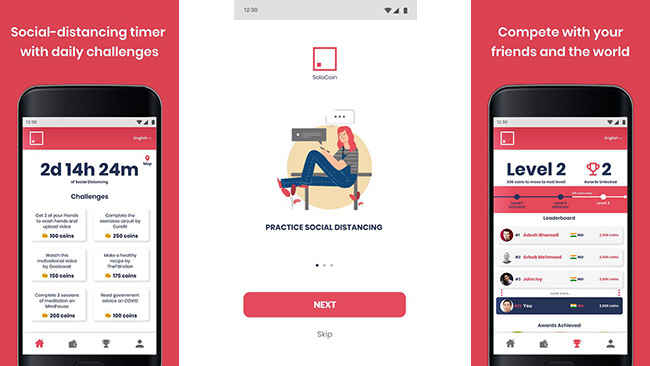
We then asked Mehmood to share with us, and other readers his personal journey with Digit as a reader of the magazine. Mehmood replied, “Digit has played a vital role in the development of my tech/startup mindset. I’m reading Digit since I was 13, mostly purchased from the nearest railway station. I used to read Chacha Chaudhary and Billoo a lot during those times. But one day while I was browsing for something different I encountered Digit. The shopkeeper recommended to me that it has computers and mobile phones in it. I loved computers and working on the computer since when I was 8 but never thought to do anything with it except for getting a job. Once I got the magazine I was hooked. I got into tech after reading amazing articles on digit. I realized how awesome career in tech can be. Not to mention the articles about tech entrepreneurs have motivated me to start my own tech startup and that led me to learn to program and founding my first startup at the age of 17.
I was fortunate enough that my parent have allotted the money for me to purchase two magazines each month - one digit and another Chip, every month. But let me tell you, digit was an expensive magazine for any 13 yr old at that time and buying directly from stores is not at all cheap. I used to eagerly wait for the 2nd date of every month for Digit to get to the store. However, I somehow convinced my parents to let me subscribe to the digit, and to this day I subscribe to it. (I, however, paused the subscription due to severe lack of time because of my startup and COVID, but expecting to resume soon) The things digit taught me about tech and the awesomeness in tech are priceless and I thank every digit member and their articles, which helped a simple boy from small town to put on a path to tech-entrepreneurship and help me reach where I am today. But, picture Abhi baaki hai mere dost. Much more amazing things to come as I’m still 22.”
We followed that up by asking Mehmood what his favorite sections were, to which he replied, “My favorite sections are: Robert’s Column (1st priority), Agent 001 (For recommendations and error fixing - I like to be called the Tech guy in my network.), the reviews (because not everyone in the tech has a better parameter to judge gadgets like you guys), Digit Diary and boo-man obviously (To get a different perspective of the world), the small article snippets on the top (much informative stuff there), DGT section (love moonshot products), and last but not the least, ANNIVERSARY EDITIONS.” Watch out for our next anniversary edition, which is right around the corner.
Amazon tells its Seattle and Bellevue employees already working from home since early March that they "are welcome to do so until at least October 2" (Benjamin Romano/The Seattle Times)
Benjamin Romano / The Seattle Times:
Amazon tells its Seattle and Bellevue employees already working from home since early March that they “are welcome to do so until at least October 2” — Amazon told its corporate employees working from home since early March that they “are welcome to do so until at least October 2 …
The UN's social distancing app, 1point5, is largely ineffective at monitoring distance between people, indiscriminately picking up any Bluetooth signals (Joseph Cox/VICE)
Joseph Cox / VICE:
The UN's social distancing app, 1point5, is largely ineffective at monitoring distance between people, indiscriminately picking up any Bluetooth signals — This week a division of the United Nations announced its new social distancing app designed to help alert people when they get too close …
Reliance Jio Q4 net profit nearly triples on tariff hikes, beats expectations
Reliance Jio's hand at video-conferencing: Jio Meet app coming soon
Digital ad market is avoiding coronavirus disaster, say tech giants
Walmart is piloting a 2-hour "Express" grocery delivery service for an extra $10 fee; plans to expand to 1K stores in May, using its 74K+ "personal shoppers" (Sarah Perez/TechCrunch)
Sarah Perez / TechCrunch:
Walmart is piloting a 2-hour “Express” grocery delivery service for an extra $10 fee; plans to expand to 1K stores in May, using its 74K+ “personal shoppers” — Record usage of grocery delivery services amid the COVID-19 pandemic has led to delayed orders …
Pandemic conspiracy theories are being spread using Wayback Machine links of content already discredited by fact-checkers and even deleted (Bobbie Johnson/MIT Technology Review)
Bobbie Johnson / MIT Technology Review:
Pandemic conspiracy theories are being spread using Wayback Machine links of content already discredited by fact-checkers and even deleted — Pandemic conspiracy theorists are using the Wayback Machine to promote “zombie content” that evades moderators and fact-checkers.
The ‘PuffPacket’ could help researchers learn when, how and why people vape
Vaping is a controversial habit: it certainly has its downsides, but anecdotally it’s a fantastic smoking cessation aid. The thing is, until behavioral scientists know a bit more about who does it, when, how much and other details, its use will continue to be something of a mystery. That’s where the PuffPacket comes in.
Designed by Cornell engineers, the PuffPacket is a small device that attaches to e-cigarettes (or vape pens, or whatever you call yours) and precisely measures their use, sharing that information with a smartphone app for the user, and potentially researchers, to review later.
Some vaping devices are already set up with something like this, to tell a user when the cartridge is running low or a certain limit has been reached. But generally when vaping habits are studied, they rely on self-report data, not proprietary apps.
“The lack of continuous and objective understanding of vaping behaviors led us to develop PuffPacket to enable proper measurement, monitoring, tracking and recording of e-cigarette use, as opposed to inferring it from location and activity data, or self-reports,” said PhD student Alexander Adams, who led the creation of the device, in a Cornell news release.
The device fits a number of e-cigarette types, fitting between the mouthpiece and the heating element. It sits idle until the user breathes in, which activates the e-cigarette’s circuits, and the PuffPacket’s as well. By paying attention to the voltage, it can tell how much liquid is being vaporized, as well as simpler measurements like the duration and timing of the inhalation.
This data is sent to the smartphone app via Bluetooth, where it is cross-referenced with other information, like location, motion and other metadata. This may lead to identifiable patterns, like that someone vapes frequently when they walk in the morning but not the afternoon, or after coffee but not meals, or far more at the bar than at home — that sort of thing. Perhaps even (with the proper permissions) it could track use of certain apps — Instagram and vape? Post-game puff?
Some of these might be obvious, others not so much — but either way, it helps to have them backed up by real data rather than asking a person to estimate their own usage. They may not know, understand or wish to admit their own habits.
“Getting these correlations between time of day, place and activity is important for understanding addiction. Research has shown that if you can keep people away from the paths of their normal habits, it can disrupt them,” said Adams.
No one is expecting people to voluntarily stick these things on their vape pens and share their info, but the design — which is being released as open source — could be used by researchers performing more formal studies. You can read the paper describing PuffPacket here.
Sources: after five Thinking Machines staff left, investors are rattled, potentially impacting fundraising; two researchers quit via Slack during an all-hands (The Information)
The Information : Sources: after five Thinking Machines staff left, investors are rattled, potentially impacting fundraising; two researc...
-
http://bit.ly/2XqNIDz
-
Amrith Ramkumar / Wall Street Journal : An interview with White House OSTP Director Michael Kratsios, a Peter Thiel protégé confirmed by ...
